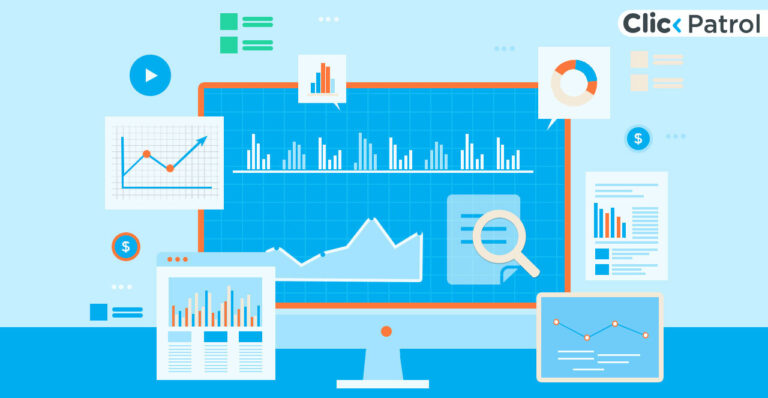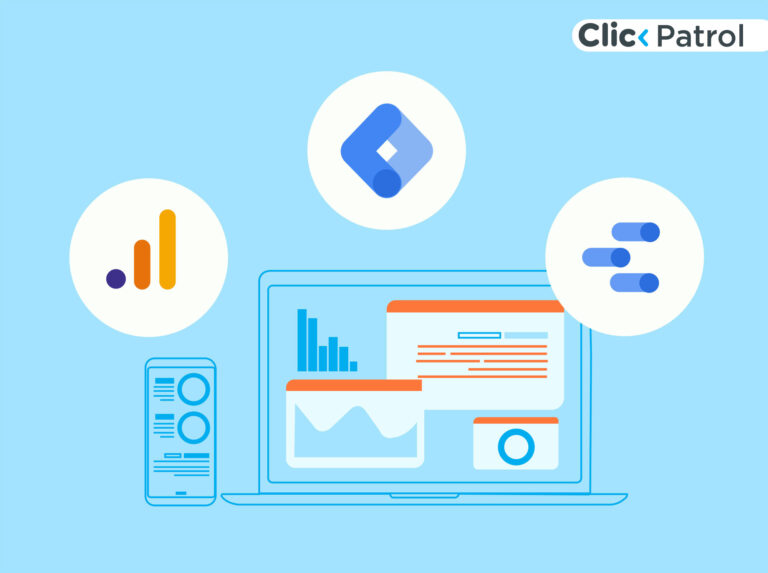
How ClickPatrol Protects Against GDPR Infringement Bots
Abisola Tanzako | Dec 12, 2024

Table of Contents
- Types of data targeted by GDPR infringement bots
- How GDPR infringement bots work
- The dangers and consequences of GDPR infringement bots
- How ClickPatrol guards against bots GDPR infringement bots
- Benefits of using ClickPatrol for GDPR compliance
- How ClickPatrol adapts to the evolving GDPR landscape
- FAQs
ClickPatrol protects against GDPR infringement bots, automated systems programmed to extract, misuse, or exploit personal information from websites and online databases. These bots target information such as names, addresses, emails, and other sensitive user data that might violate GDPR if mishandled.
GDPR violation bots, instead of conventional data-harvesting bots, work specifically to violate data privacy, frequently for financial gain or competitive advantage.
Types of data targeted by GDPR infringement bots
These bots can be particularly harmful, as any unauthorized collection of this data violates GDPR principles and exposes businesses to heavy fines and reputation damage. The data includes:
- Personally identifiable information (PII): This includes names, email addresses, contact numbers, and other data points that directly identify individuals.
- Behavioral data: Marketers and rivals can benefit from knowing user behavior, surfing patterns, or preferences, but their unlawful gathering may violate GDPR.
- Financial information: Sensitive information, such as credit card information or transaction history, may also be targeted by GDPR violation bots, subject to strict GDPR requirements.
- Sensitive personal data: This includes data on racial or ethnic origin, political opinions, religious beliefs, health data, and other categories protected by GDPR.
How GDPR infringement bots work
Bots that violate GDPR use various methods to obtain personal information without the user’s permission. They frequently utilize IP masking tactics and impersonate trustworthy people to evade discovery. This is how they usually work:
- Data harvesting and web scraping: GDPR violation bots commonly use web scraping technologies to retrieve personal information. For instance, bots can steal user data without being noticed if a website unintentionally places it in a publicly accessible area, evading privacy protections.
- Form and field injection: Bots may interact with input fields and forms on websites to obtain personal data or alter forms in ways that reveal information. For instance, bots could use search or query forms to obtain private data from databases without authorization.
- Cookie theft and session hijacking: Sophisticated bots can take over user sessions and gather session data and cookies that expose private user information. This allows them to avoid authentication procedures and obtain user data without authorization.
- IP masking and proxy rotation: GDPR infringement bots frequently use proxy servers and VPNs to conceal their IP addresses and evade detection. Because they can switch IP addresses across different locations, security systems need help recognizing them as bots.
- Sophisticated bot behavioral imitation: To avoid raising suspicions, more sophisticated infringement bots imitate user behavior by mimicking mouse movements, page scrolling, and the intervals between activities. This makes detection especially difficult for conventional security measures.
The dangers and consequences of GDPR infringement bots
Businesses face significant risks from GDPR infringement bots since they risk data protection and expose them to legal and financial penalties. Here’s a closer look at these bots’ possible effects:
- GDPR penalties for non-compliance: Organisations that violate the GDPR risk suffering severe penalties, which can amount to up to 4% of their yearly worldwide revenue or €20 million, whichever is higher. A breach occurs when bots get unauthorized access to personal data, subjecting companies to harsh financial consequences.
- Harm to reputation and brand trust: GDPR infringement bots successfully scrape personal data and make it public information, damaging customer trust. Consumers anticipate that companies will protect their privacy and may take their business elsewhere if data protection appears insufficient.
- The danger of data breach: Infringement bots violate GDPR and raise the possibility of more extensive data breaches. They can compromise databases and infiltrate systems, exposing personal information that bad actors can use to compromise users and companies.
- Competitive disadvantage: Unauthorized access to this data can create an unfair playing field by providing unethical competitors with insights into consumer behavior.
- Increased operational costs: Businesses of all sizes may incur additional costs to detect and mitigate GDPR infringement bots, which include security software, data recovery, and damage control.
How ClickPatrol guards against bots GDPR infringement bots
ClickPatrol is a sophisticated fake ad prevention and bot detection technology that can combat GDPR violation bots with all-encompassing, AI-powered defense. Businesses can protect personal data, guarantee GDPR compliance, and prevent the financial and reputational consequences of data breaches with ClickPatrol’s multi-layered strategy. ClickPatrol handles GDPR infringement bots in this way:
- Real-time detection powered by AI: ClickPatrol separates automated bots from actual users by analyzing real-time website visitor activity using artificial intelligence. Its algorithms identify possible GDPR infringement bots and remove them before data is stolen by analyzing browsing trends, traffic patterns, and odd activity like repetitive or high-frequency requests.
- Behavioral analysis to identify malicious activity: ClickPatrol’s tools identify unusual activity linked to form injection or data-scraping bots. By identifying patterns such as repetitive form submissions or excessive query requests, ClickPatrol can stop bots’ efforts to access personal data fields and prevent GDPR violations.
- Geo-blocking and advanced IP: With ClickPatrol, users can ban suspect IP addresses, IP ranges, or areas where bot activity is expected. By limiting access from particular regions, geo-blocking provides an additional line of defense against bots that try to gather user data from non-compliant areas.
- Fingerprinting of devices and sessions: ClickPatrol uses session and device fingerprinting methods to identify user identity discrepancies. This stops attempts at session hijacking and identifies bots that try to impersonate trustworthy users by tracking their device-specific patterns and identifying unique digital fingerprints.
- Extensive user agent filtering: Bots frequently try impersonating real agents by imitating popular browsers or gadgets. By comparing them to an extensive database of bot signatures, ClickPatrol’s user-agent filtering techniques distinguish between human and bot user agents, stopping infringing bots from hiding who they are.
- Adaptive machine Learning for continuous protection: ClickPatrol’s machine learning models adjust to the newest bot strategies as fresh data inputs are added; because ClickPatrol constantly enhances its detection and response capabilities, this guarantees that even sophisticated bots cannot penetrate its security measures.
Benefits of using ClickPatrol for GDPR compliance
ClickPatrol provides several advantages that can significantly improve a business’s capacity to uphold GDPR compliance and stop data privacy violations:
- Proactive GDPR compliance: Thanks to ClickPatrol’s real-time monitoring and detection capabilities, businesses can proactively detect and stop GDPR infringement bots before they have a chance to gather unauthorized data. This proactive strategy safeguards private data and aids in the company’s GDPR compliance initiatives.
- Decreased financial and legal risks: ClickPatrol reduces the possibility of GDPR-related fines by blocking illegal data acquisition. Its activity reports and data logs can also be used as proof in GDPR investigations, assisting businesses in proving their dedication to data security.
- Improved user confidence and brand trust: Using ClickPatrol to protect user data increases customer confidence by reaffirming a company’s dedication to data protection. Customers are more inclined to trust a company that takes the extra step to protect their data and adhere to privacy regulations.
- Improved search engine optimization and competitive edge: GDPR violation bots frequently hurt SEO by producing duplicate material or weakening a brand’s online presence. By preserving site integrity, ClickPatrol’s blocking features free up companies to concentrate on expansion rather than data security.
- Customized security insights reports: ClickPatrol offers comprehensive reports on bot activity to assist companies in better understanding possible risks and honing their security tactics. These reports simplify responding to changing GDPR threats and encourage ongoing compliance efforts.
How ClickPatrol adapts to the evolving GDPR landscape
ClickPatrol keeps up with the changes in GDPR legislation and the increasing demands for compliance. Due to its AI-driven machine-learning models and reporting features, it is the perfect option for companies looking for a flexible, scalable, and efficient GDPR protection solution. ClickPatrol stays ahead of new bot dangers and assists businesses in navigating the complexity of data protection laws by emphasizing sophisticated behavioral analysis and ongoing learning.
Businesses must prioritize GDPR compliance and safeguard user information with dependable technologies like ClickPatrol in an increasingly data-driven digital world. ClickPatrol enables organizations to comply with regulatory frameworks, safeguard personal information, and establish a secure online presence by stopping GDPR infringement bots from obtaining unauthorized access.
FAQs
Q. 1 Does ClickPatrol help businesses stay GDPR-compliant?
Absolutely. ClickPatrol helps companies protect personal data and comply with GDPR by preventing bots that gather unauthorized data, lowering the risk of non-compliance fines.
Q. 2 How can companies identify bots that infringe the GDPR?
Advanced bot detection systems like ClickPatrol, which uses behavioral analysis, IP tracking, and user-agent filtering to identify and block unauthorized bot activity in real-time, can help businesses identify infringing bots.
Q. 3 How does ClickPatrol defend against bots that infringe the GDPR?
ClickPatrol is an advanced fraud protection and bot detection technology that detects and stops GDPR violation bots using machine learning and AI-driven analytics. Real-time monitoring, geo-blocking, session fingerprinting, and adaptive bot filtering are some of its characteristics.

